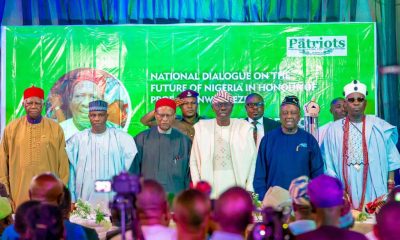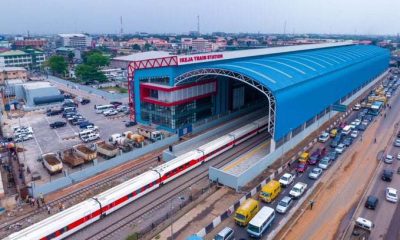Arts & Books
Entertainment, Nigeria’s next gold mine

By Adebayo Obajemu
Entertainment and the arts are a piece of soft power that’s deployed and projected in international power politics for advantage and respect. If strong and pervasive enough, it can be a form of cultural imperialism.
The American high culture and its pop variant have dominated the world since the turn of the 20th century, the best exemplification of this power is the Hollywood, close to this is the Ian Fleming’s James Bond associated with the British; while the Indians are best known to the outside world for their Bollywood.
The growing film and entertainment industry in the country popularly called Nollywood, is widely seen as the third most revenue- generating entertainment industry in the whole world, and according to analysts if this advantage is maximally explored, it can turn the next revenues gold mine for the country.
It is in realisation of the revenue value of the burgeoning industry that the Buhari administration.
last year handed over the National Theatre and its surrounding lands to the Central Bank of Nigeria, CBN, for restoration, which aims at creating millions of jobs for youths in the country and diversifying the country’s economy.
According to the CBN, the country has the potential of earning $20 billion annually from the creative industry when the edifice is renovated into four pillars, namely information technology, music, film and fashion.
At the time of the hand over of the facility to CBN in Lagos, in attendance were the Minister of Information and Culture, Lai Mohammed; Governor of CBN and Chairman, Bankers Committee, Godwin Emefiele; Governor Babajide Sanwo-Olu of of Lagos State; Deputy Governor of Lagos State, Dr. Obafemi Hamzat, among others.
In his remarks, the CBN Governor and Chairman, Bankers Committee, Godwin Emefiele, expressed gratitude to President Muhammadu Buhari for the handing over of the edifice constituting over 132,000 hectares of land.
He said: “The National Theatre, Iganmu, Lagos, which is being handed over today to the Bankers Committee is expected to serve as the initial pilot for the Nigeria Creative Industries Centre.
“Upon completion in another 18 months, this area would have transformed into Nigeria’s Creative industrial Centre, which will be comparable to other world class entertainment and convention centres in any part of the world.
“Following the completion of the renovation works at the National Theatre, with the supporting facilities that will be built around it, which include a hotel and an expansive conference centre, we intend to set up similar Creative Industries centres in Kano and Port Harcourt.”
According to Emefiele, the handover of the edifice to the CBN/Bankers Committee is indeed timely when one considers the external headwinds facing our economy today.
However, he noted: “With our human capital resources and an enabling environment that will help harness the creative talents of our youths, Nigeria has the potential to earn over $20 billion annually from the creative industry.”
Speaking at the ceremony, Minister of Information and Culture, Alhaji Lai Mohammed, said the planned restoration and upgrade of the iconic National Theatre would generate about 10,000 jobs during and after the restoration.
He said: ‘’Please permit me to start off by making a clarification: this iconic National Theatre remains a national heritage and will not be ceded to any person or group, as some have chosen to frame what we are doing here today.
‘’What we are here to do is to hand over the National Theatre for restoration and upgrade and the fallow land within the premises to the Central Bank and the Bankers’ Committee for development.
‘’The Federal Ministry of Information and Culture holds the keys to the National Theatre on behalf of all Nigerians.”
Alhaji Mohammed said the N25 billion project, tagged the Lagos Creative and Entertainment Centre Project, was a Public-Private Partnership, PPP, that will be executed in two phases, with Phase 1 being the restoration and upgrade of the National Theatre to its glory days at a cost of N7 billion and Phase II, the development of the adjoining fallow land at a cost of N18 billion.
‘’The good news is that this project will not lead to a single job loss. Instead, it will create more. Some 6,000 jobs will be created during the construction phase, while the completed project could generate up to an additional 600 permanent and 2,000 to 3,000 call-on/call-off jobs. This is as good as it gets!’’ he said.
The Minister described the handover of the facility as a “historic day in the annals of the Creative Industry in Nigeria,” describing the project was a win-win for all involved.
He said: ‘’For over 40 years, no major renovation work has been done on the National Theatre, while the adjoining land has been lying fallow.
‘’Many attempts to restore the National Theatre have failed. And the government has no money to restore the complex. As you know, this is the hub of the Creative Industry in Nigeria.
‘’The National Theatre was established to encourage the advancement of the performing arts throughout the country; to create opportunities for performing artists of the country as well as to aid the promotion of social development and the improvement of the quality of life. In its present state, it is not living to its billing.’’
Nollywood has come along way, and this growth in Nigeria’s movie industry, has made it to achieve global recognition as the third biggest in terms of revenue earnings after America’s Hollywood and India’s Bollywood, the Managing Director of the Nigerian Export Import Bank, NEXIM, Roberts Orya, said recently.
Mr. Orya, who was a guest lecturer at the Distinguished Lecture Series of the Pan-African University, Lagos, said the Nigerian burgeoning film industry has forced global recognition on account of its innovation, imaginativeness and prolific performance, resulting in revenue receipts of about $300million to $800million per annum in revenue earnings in recent years.
In view of this gargantuan revenues, according to Mr. Orya, practitioners and businessmen from Hollywood and other global equivalents can no longer ignore Nollywood, as is being manifested in several joint collaboration movie works in recent times.
The Nexim MD, who spoke on the topic: “That They May be One: Towards a Greater Synergy Between Nexim and the Creative Industry”, noted that Nollywood is today globally adjudged as the most prolific film industry with consistent production of more than 2,000 titles in Nigeria’s three major languages every year since 2008. He also pointed out that Nollywood has very high prospects for growth and sustainable development.
He said a combination of factors, including prevalence of a high pool of creative talents; strong and growing domestic entertainment industry; established overseas market demand in Africa, UK, USA and the Pacific Islands; coupled with huge Diaspora population, would spur the industry and its practitioners to greater heights.
Government’s attention and recognition of the industry has been a major incentive, he said, adding that apart from the industry’s contributions to create employment opportunities for Nigerian youths, it is also a foreign exchange earner, to justify the Federal Government’s support through a $200 million (N30 billion) Entertainment Industry Fund and the N3 billion grant recently announced.
Despite the encouraging incentives, Mr. Orya said the industry still faces a number of challenges, including very low production for theatrical releases and cross-border co-production arrangements as well as inadequate exhibition/theatrical infrastructure, which he said are militating against it realizing its full potentials.
“It is unbelievable that a country of more than 170million people currently has less than 60 modern screens in multiplexes located in five cities, namely Abuja -15, Lagos – 17, Port Harcourt -14, Enugu – 5 and Uyo – 6. This, when compared with India, is one of the lowest in the film market, with India having over 13,000 screens translating to 12 screens per million people,” he said.
Now that the CBN is set to change the outlook of the National Theatre which is the symbol of the entertainment industry, value addition in terms of revenue-generation for the country; and job creation for those in the industry will take on a new high.
Recently, it would be recalled, the Central Bank of Nigeria (CBN) showed its support for the $100 million by the Bankers’ Committee meant for the revamping of the National Arts Theatre.
This was disclosed by the Governor of the Central Bank of Nigeria, Godwin Emefiele, at the ‘Arise Fashion 2021’ programme, as he noted that the country’s deposit money banks were set up in 2020 for creative industry financing.
Recall that the Bankers’ Committee is expected to provide funding for a prototype cluster labelled, ‘The Signature Cluster’ which consists of a building each for music, film, fashion and information technology verticals.
According to Emefiele, the four hubs to be established as follows: “The hubs are the fashion hub, music hub, film hub, and to support these, the IT hub, where we will have Nigeria’s young and talented IT developers, developing software to increase and earn revenue for themselves as well as to support the country’s revenue base.”
Emefiele said, “The project is costing the Bankers’ Committee almost $100 million to resuscitate and revamp the National Art Theatre.”
“The National Art Theatre can contain a gathering of at least 7,500 people. We do hope that, come 2023 and onwards, we will begin to see these fashion shows being held around the premises of the National Art Theatre.
“We are trying to build infrastructure to support the creative industry in Nigeria.”
He explained that the goal was to make it easier for young and talented people in the creative industry to get funds to start or expand their enterprises.
Nduka Obaigbena, Chairman of Arise News, said the company opted to highlight the event, which was broadcast live on television in 200 countries and supported by Arise News and other media.
He said, “We celebrate Nigeria because, like it or not, the building blocks of the Nigerian century is afoot despite the challenges that we face; our generation will ensure that we build a Nigeria that can stand the test of time in 2050 as the third largest and most populous economy in the world.
“And those building blocks you can see in the power of creativity, technology and the power of everything else. We are determined to tell the world that the time of Nigeria is here.”
Background Story
Recall that some time in July 2020, the Federal Government announced the official handover of the National Arts Theatre Complex to the CBN and the banks under the aegis of the Bankers’ Committee, in order to begin the renovation of the facility.
The Federal Executive Council had earlier given its nod to an MOU between the Federal Ministry of Information and Culture and the Bankers’ Committee for the renovation of the National Arts Theatre with the CBN expected to provide about N21.89 billion.
In February of 2021, the Governor of the Central Bank of Nigeria (CBN), Godwin Emefiele, led other members of the Bankers’ Committee to sign a Memorandum of Understanding (MOU) with the Federal Government for the handover of the National Arts Theater, Iganmu, Lagos.
The Bankers’ Committee will be expected to manage the facility for a few years before handing it over to the Federal Government.
It is clear that this development will usher in new era in the industry.
Professor Adesoji Olampitan, theatre scholar told Business Hallmark that. “Until this development, the National Theatre stood as the embodiment of national disgrace and official disdain for the arts,a sector much cherished in advanced countries of the world since apart from its revenues value, it is also seen as a form of soft power.”
He commended the Buhari administration for the Initiative.














